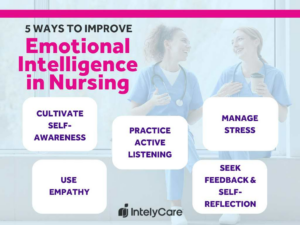5 Ways to Develop Emotional Intelligence in Nursing

What would you do if you had to deliver devastating news to a patient or their family and were not sure how to go about it? What if you’re working with a patient who isn’t complying with the care plan you’ve agreed on? These scenarios show the importance of emotional intelligence in nursing — the way that you interact with these patients has a profound impact on their care.
Understanding emotional intelligence won’t just make you a better clinician, but also a better friend, parent, partner, and person. We’ll talk about what it means to use emotional intelligence as a nurse and nursing leader, and how you can build your EQ muscles to be a better communicator.
What Is Emotional Intelligence in Nursing?
Emotional intelligence, sometimes called EQ or EI, is the ability to perceive, understand, express, and manage emotions. This soft skill isn’t a box to check or a task to complete — it’s a constant learning process. There are four core competencies of emotional intelligence:
- Self-awareness: Your understanding of your own strengths and weaknesses.
- Self-management: The way you manage your outlook and response to different situations.
- Social awareness: Recognizing others’ emotional state, and acting with empathy.
- Relationship management: Navigating how you relate and communicate with others, such as friends, family, patients, peers, managers, and others.
These skills are essential for nurses who are tasked with supporting patients through challenging experiences, working with people from diverse backgrounds, and being a witness to human suffering.
Being emotionally intelligent doesn’t just benefit patients — it could also improve your life by increasing job satisfaction and reducing stress. Some research even shows it can protect against emotional burden and burnout.
Importance of Emotional Intelligence in Nursing Leadership
If you want to advance your career into management, administration, or nurse advocacy, working on emotional intelligence is essential. Great leaders have a high degree of emotional intelligence, and some research even shows that EQ is twice as important as more cognitive leadership skills like long-term vision and big-picture thinking.
You may have worked in the past with leaders who lack EQ skills, and know that the whole team can suffer as a result. A manager without emotional intelligence may avoid conflict, blame others, and stonewall when a teammate brings a complaint. They may be passive-aggressive and feel unequipped to repair relationship problems.
What if you want to be a leader or pursue nurse manager and leader (CNML) certification but you’re not sure you have the emotional intelligence necessary to do the job well? The good news is that emotional intelligence can be learned and increases with age. It’s also a constant development process — you’ll make mistakes, recover from them, and gain insights along the way.
Emotional Intelligence in Nursing: Examples
Looking for more concrete examples of what EQ looks like in the nursing world? Once you know what to look for, you’ll probably notice that you use these skills all the time. Here are some examples:
- Comforting a grieving family: A physician is delivering news to a family about their mother’s terminal illness. The nurse sits with them, listening to their grief and offering comfort where possible, encouraging them to take their time and come to the team with questions.
- Dealing with an irate patient: A nurse is caring for a patient who is dependent on opioid medication for chronic pain, and the patient is frustrated because their regimen has been changed. Knowing that the patient is in pain and upset, the nurse uses patience when explaining the new regimen and other pain management options.
- Supporting a distressed coworker: After a code blue, a nurse who is precepting a new graduate notices the newer nurse is distressed. The nurse pulls the new grad aside and tells them that they did a great job, and they can take a break in the lunch room together to debrief.
- Supporting patients through treatment: A nurse in a community health clinic learns that a patient is not taking their antidepressant medication. Rather than labeling them “non-compliant,” the nurse asks them why they don’t take it, and how they can be better supported in their mental health goals.

How to Improve Emotional Intelligence in Nursing: 5 Strategies
1. Cultivate Self-Awareness
Do you consider yourself self-aware? Research shows that 95% of people do. Yet, using measures of self-awareness, only 10–15% of people actually are. And some studies suggest that the more power people obtain, the more likely they are to overestimate their self-knowledge. This is one of the core components of emotional intelligence, and starting to build your own self-awareness will make you a more functional person and nurse.
You can begin by trying to notice your own emotions. Be curious, not judgemental, about your own motivations, experiences, and biases. Ask yourself, Why did I feel this way? Is there another way to look at this scenario? Building a deeper understanding of yourself will help you regulate your emotions and see negative feelings as normal (if uncomfortable) experiences.
2. Practice Active Listening
In addition, active listening is essential for empathetic communication and understanding others’ perspectives. Active listening is the most effective and deepest level of listening, and using it can reduce medical errors and keep patients safe. Communicating isn’t a skill we have at birth — it’s something we develop through a constant learning process.
When you’re in conversation with a teammate, patient, or family member, give them your undivided attention, maintain eye contact, and show that you’re listening through verbal and nonverbal cues. While they’re talking, think about what they’re saying, not what you want to say back. By actively listening, nurses can validate others’ feelings, build trust, and strengthen relationships.
3. Use Empathy
When you use empathy as a nurse, you give patients the space to express their concerns and feel safe. High patient volumes and burnout can make empathy a challenging practice — when you’re in the middle of passing medications to five patients, you probably won’t have the time to sit with each of them and hear their stories. Still, practicing empathy when you can is an essential part of being a great nurse.
Nurses can enhance their empathy by seeking to understand patients’ experiences, emotions, and needs. When a patient refuses a treatment or medication (and you’ve already established rapport), ask them why in a nonjudgmental way. Try to put yourself in your patient’s or coworker’s shoes. When you try to empathize with others, you broaden your own perspective, make room for other’s experiences, and build your emotional intelligence in nursing.
4. Manage Stress
Nursing can be a high-stress role — patient’s lives are in your hands, and you’re making 1,000 decisions a shift. Nurses work within complex systems, continuously interacting with other members of the healthcare team, families, and patients. On top of this, using emotional intelligence skills can sound like another layer of tasks that you just don’t have the energy for.
It’s hard to give others your best when you’re not treating yourself well. Nurses can work on developing healthy coping mechanisms such as mindfulness, relaxation techniques, and going to therapy if you need to. Seeking social support, participating in regular physical activity, and prioritizing self-care can help nurses manage stressors and maintain emotional resilience in challenging situations.
5. Seek Feedback and Self-Reflection
Continuous learning is key to emotional intelligence development. Nurses can enhance their EQ by asking for feedback from peers, mentors, and supervisors, and using it to identify areas for growth and improvement. For clinicians and other on-the-job learners, receiving feedback can help everyone improve. When you get constructive feedback, try to see it as a way to get better, not as a criticism of you as a person.
Engaging in regular self-reflection, like journaling, can also help you learn more about the dynamics within and around you. What opportunities did you have to practice emotional intelligence in your last shift? What did you do well? How could you have done better? By cultivating a growth mindset and a commitment to lifelong learning, you can continue to build emotional intelligence skills and enhance your professional practice.
Looking for Fresh Opportunities to Practice Emotional Intelligence in Nursing?
If you’re ready for a new role, IntelyCare can help. We have job openings in many areas and specialties. Sign up for nursing job notifications to get tailored roles right in your inbox.
